Book contents
- Frontmatter
- Contents
- Preface
- Tables
- Abbreviations
- Genealogical table of the De Hautevilles of Sicily
- Note on Measurements
- Introduction
- 1 ‘In the time of the Saracens …’
- 2 ‘When first the Normans crossed into Sicily …’
- 3 ‘Our lady, the Regent Adelaide, and our Lord, the Count Roger, her son’, 1101–30
- 4 The earliest products of the royal dīwān, 1130–43
- 5 The jarāʾid renewed, 1144–5
- 6 The records of the royal dīwān. Part I: the jarāʾid al-rijāl
- 7 The records of the royal dīwān. Part II: the dafātir al-ḥudūd
- 8 The duties and organisation of the royal dīwān, 1141–94
- 9 ‘The people of his state’. The ‘palace Saracens’ and the royal dīwān
- 10 The Norman dīwān and Fāṭimid Egypt
- 11 Royal dīwān and royal image
- Appendix 1 Catalogue of dīwānī documents
- Appendix 2 Provisional catalogue of private documents
- Appendix 3 Abū Tillīs – ‘Old Wheat-sack’
- List of References
- Index
- Titles in the series
5 - The jarāʾid renewed, 1144–5
Published online by Cambridge University Press: 10 March 2010
- Frontmatter
- Contents
- Preface
- Tables
- Abbreviations
- Genealogical table of the De Hautevilles of Sicily
- Note on Measurements
- Introduction
- 1 ‘In the time of the Saracens …’
- 2 ‘When first the Normans crossed into Sicily …’
- 3 ‘Our lady, the Regent Adelaide, and our Lord, the Count Roger, her son’, 1101–30
- 4 The earliest products of the royal dīwān, 1130–43
- 5 The jarāʾid renewed, 1144–5
- 6 The records of the royal dīwān. Part I: the jarāʾid al-rijāl
- 7 The records of the royal dīwān. Part II: the dafātir al-ḥudūd
- 8 The duties and organisation of the royal dīwān, 1141–94
- 9 ‘The people of his state’. The ‘palace Saracens’ and the royal dīwān
- 10 The Norman dīwān and Fāṭimid Egypt
- 11 Royal dīwān and royal image
- Appendix 1 Catalogue of dīwānī documents
- Appendix 2 Provisional catalogue of private documents
- Appendix 3 Abū Tillīs – ‘Old Wheat-sack’
- List of References
- Index
- Titles in the series
Summary
De resignandis privilegiis
In the autumn of 1144, King Roger commanded his vassals in Calabria and Sicily to present, for scrutiny and renewal, all privileges previously granted by him and by his ancestors. The registers of Erich Caspar, Paolo Collura and Horst Enzensberger list thirty renewals issued between October 1144 and June 1145, and to these three more may be added from the archive of San Salvatore di Messina, giving a total of thirty-three known renewals. Although most confirm between one and three ancient privileges, some feudatories would appear to have presented their entire archive: thirteen charters from San Filippo di Fragalà, and fifteen from Santa Maria di Turri, while Abbot Filadelfos of San Bartolomeo di Trigona submitted no less than nineteen privileges for renewal. A rough calculation – and, given the poor editions in which most of these renewals are available, it is extremely rough – indicates that, in all, some one hundred and twenty earlier privileges were renewed, many of which are now lost, and thus known only through these renewals. The true number of both originals submitted for renewal and renewals issued must have been significantly higher, for it is clear that many renewals have been lost without trace, especially those issued to lay barons. The jaraʾid renewed in 1145 all refer to the registers of villeins renewed for the barons, but only one survives. In total, only two lay recipients are known to have had renewals in 1144–5, and that is because their lands happened later to pass to the church, so that the associated privileges were preserved in ecclesiastical archives.
- Type
- Chapter
- Information
- Arabic Administration in Norman SicilyThe Royal Diwan, pp. 115 - 143Publisher: Cambridge University PressPrint publication year: 2002
- 1
- Cited by

